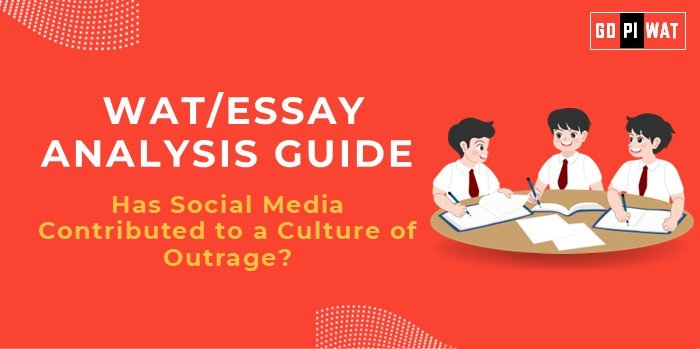📋 Has Social Media Contributed to a Culture of Outrage?
🌐 Understanding the Topic’s Importance
Social media’s influence on public opinion is undeniable, affecting everything from politics to brand image. B-school students should understand the nuances of this influence as future leaders navigating public opinion and brand management.
📝 Effective Planning and Writing
- ⏱️ Time Allocation:
- Planning: 5 minutes
- Writing: 20 minutes
- Review: 5 minutes
- 📚 Preparation Tips:
- Gather data on social media impact.
- Identify major stakeholders.
- Consider both positive and negative aspects of social media usage.
💡 Introduction Techniques for Essays
- ✍️ Contrast Approach: “While social media has democratized expression, it has also given rise to a culture where outrage often overrides reason.”
- 💡 Solution-Based Approach: “Addressing the issues of outrage culture in social media requires a balance between freedom of expression and responsible content moderation.”
- 📖 Timeline Approach: “In the past decade, social media’s role has evolved from a networking tool to a force that shapes public discourse and often ignites outrage.”
📖 Structuring the Essay Body
- 🏆 Achievements: Social media’s role in increasing awareness, mobilizing activism, and holding power accountable.
- ⚠️ Challenges with Comparative Analysis: Discuss echo chambers, misinformation, and mental health impacts. Reference cases like the U.S. elections or misinformation in India.
- 🔮 Future Outlook: Highlight initiatives toward healthier social media engagement, such as algorithm transparency and digital literacy programs.
🎯 Concluding Effectively
- ⚖️ Balanced Perspective Conclusion: “While social media has empowered voices, its role in fostering outrage cannot be ignored. Striking a balance between expression and responsibility will be crucial.”
- 🌍 Global Comparison Conclusion: “Countries are experimenting with policies to counter misinformation and outrage, indicating a global need for balanced digital engagement.”
📊 Analyzing Successes and Shortcomings
- ✅ Key Achievements: Social media as a tool for rapid mobilization, increased accountability, and heightened awareness.
- ⚠️ Ongoing Challenges: Misinformation, mental health concerns, and polarization.
- 🌍 Global Context: Highlight efforts in countries like Germany, which enforce stricter content moderation, and Japan’s focus on mental health.
🔧 Recommendations for Sustainable Progress
- 📜 Responsible Content Creation: Encourage ethical and balanced communication on social media platforms.
- 🌱 Digital Literacy Programs: Improve public awareness and education on identifying misinformation and promoting healthy engagement.
- 📈 Algorithm Transparency: Ensure that platforms disclose how content is prioritized to foster trust and reduce bias-driven outrage cycles.
✍️ Sample Short Essays
- ⚖️ Balanced Perspective: “Social media has amplified many voices but has also intensified polarizing viewpoints. For sustained positive influence, platforms must encourage balanced discourse and responsible engagement.”
- 💡 Solution-Oriented: “While outrage can drive awareness, unchecked anger often leads to division. Social media giants and policymakers must work together to encourage respectful discourse.”
- 🌍 Global Comparison: “Countries worldwide are grappling with the effects of social media outrage. A balanced, international approach to digital policy and literacy can promote healthier engagement.”


